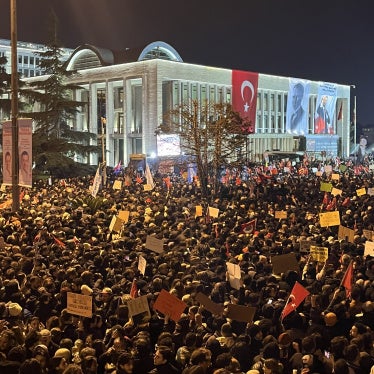(Moscow) – Next week, Russia will host the Winter Paralympics in Sochi. Though American and British leaders have announced they will not attend the opening of the Paralympics to protest Russia's authorization of military force in Ukraine, thousands of athletes and spectators from these and 43 other countries will arrive in Sochi to compete nonetheless. Athletes will find Paralympic competition venues equipped with sloping ramps, elevators with Braille buttons, wheelchair accessible spectator seating, and auditory equipment for blind visitors to listen to event announcers. In central Sochi, they can enjoy tourist attractions such as a wheelchair accessible boardwalk, cafes, and stores - all this in a country where Soviet politicians refused to host a Summer Paralympics in 1980, claiming there were “no disabled citizens in the USSR.”
However, according to recent investigations by the Associated Press and others, Paralympic athletes who have already arrived in Sochi are finding accessibility even in the Olympic Park haphazard. Some athletes report that door frames at some Paralympic competition venues are raised from the floor, obstructing wheelchair access. Two accessible bathrooms in the Olympic Park were found to be stuffed with janitorial supplies, making them unusable. Beyond the Olympic Park, there have been reports that drivers of Sochi's wheelchair-accessible buses don't stop to lower platforms so that people with disabilities can board.
The Russian government's obligations as a Paralympic host also go beyond building accessible competition and tourist venues. They include fostering a lasting legacy of social inclusion for Russian citizens with disabilities - in Sochi and across the country. Judging by the uneven job the government has done in and beyond the Olympic Park, a legacy of accessibility needs urgent attention. Especially telling are the experiences of Sochi residents with disabilities.
In 2013 I visited 19 year-old Sochi resident Sergei, who had recently lost use of his legs in a sports accident. Sergei spent his days in his dimly lit fifth floor apartment where he watched television and completed his college coursework remotely. His apartment building lacked an elevator and ramp, so he relied on friends to carry him up and down the stairs. After Sergei's accident, he and his family wrote multiple letters to the regional government requesting physical therapy services to which he is entitled by law. The government responded that no such rehabilitation services are available. When Sergei's mother approached officials for an explanation, they told her that rehabilitation was unnecessary, as Sergei would never walk again.
When I contacted Sergei recently, he had regained partial use of his legs through rehabilitation he obtained in Moscow with the help of an acquaintance. But he still has no means to leave his Sochi neighborhood independently because the city's new accessible low-floored buses do not come near his home. As we prepare to laud the world's best Paralympic athletes, Sergei - just a few kilometers away from the Olympic Park - is cut off from the main events.
He is not alone in his lack of access to his own home city. Many Russians with disabilities live in apartment buildings without elevators and accessible ramps and rarely if ever leave their homes. Others who want to leave, can't - because services such as public transportation remain inaccessible to them. As one Russian disability rights advocate told me on a recent visit to Moscow, “The first problem is that many people with disabilities cannot leave their homes. No one sees them. How can you make good policies for a population you cannot see?”
Both the Russian government and the International Paralympic Committee (IPC), which oversees the Paralympic Games, have stressed that the sight of Paralympic athletes competing before Russian spectators will go a long way to promote a more accessible environment nationwide. IPC representatives recently said, “It is the Games themselves and the exposure to the performances of Paralympians that act as the catalyst for the greatest change.”
Greater social visibility for people with disabilities would be a key impetus for change in Russia, but this cannot happen through the Games alone. Only the sustained presence of people such as Sergei on Russian sidewalks and in parks, in Russian workplaces and universities, and in other public spaces, will demonstrate to policymakers and the public that people with disabilities can live independently and contribute meaningfully to society.
Some change is already under way. In December the government introduced a federal bill to hold local governments responsible for implementing federal accessibility laws, including, among other things, requirements for people with disabilities to get the rehabilitation services they are entitled to and for their housing and transportation to be made completely accessible.
Without concrete improvements in accessibility for people with disabilities, the strength and independence of Paralympic athletes may seem to the Russian public more like the exception than the rule.








